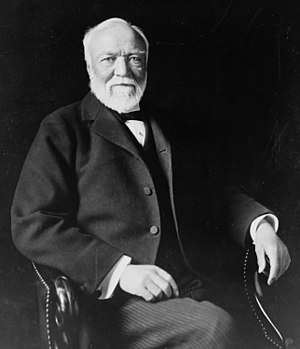Scottish society

Scotland has a deep-rooted pattern of philanthropic behaviour,[1] personified by the likes of Andrew Carnegie. His donations to the higher education sector contributed to the modern development of the Scottish universities.
Scottish society is the group behaviour of Scots, how they organise themselves and make decisions. The social history of Scotland is a major field within the academic study of Scottish history.
Scottish society is based on Western society, and has made key contributions to the spread of Western culture throughout the world. It has been developing for many centuries, since Scotland started to emerge as a country in the Early Middle Ages.
Scots share many social and cultural characteristics, for example dialect, music, arts, social habits, cuisine and folklore. Scotland is an ethnically and racially diverse country as result of large-scale immigration from many different countries throughout its history.
See also
References
- ↑ Fogg, Ally. "Why are English people giving less to charity than Scots?". The Guardian. Retrieved 18 February 2018.
Further reading
- Knox, W W. "A History of the Scottish People - Summary of Economy and Society in Scotland 1840-1940" (PDF). SCRAN. Historic Environment Scotland. Retrieved 18 February 2018.
- Harvie, Christopher. Scotland and Nationalism: Scottish Society and Politics, 1707 to the Present. Routledge.
- Housten, Robert Allen; Whyte, Ian D. (2005). Scottish Society, 1500-1800. Cambridge University Press. ISBN 9780521891677.
- Whatley, Christopher A. (2000). Scottish Society, 1707-1830: Beyond Jacobitism, Towards Industrialisation. Manchester University Press. ISBN 9780719045417.
External links
This article is issued from
Wikipedia.
The text is licensed under Creative Commons - Attribution - Sharealike.
Additional terms may apply for the media files.